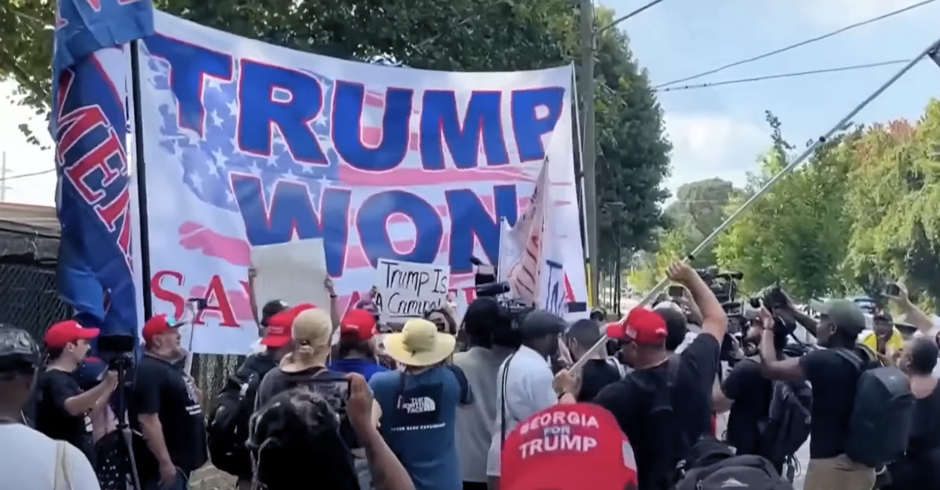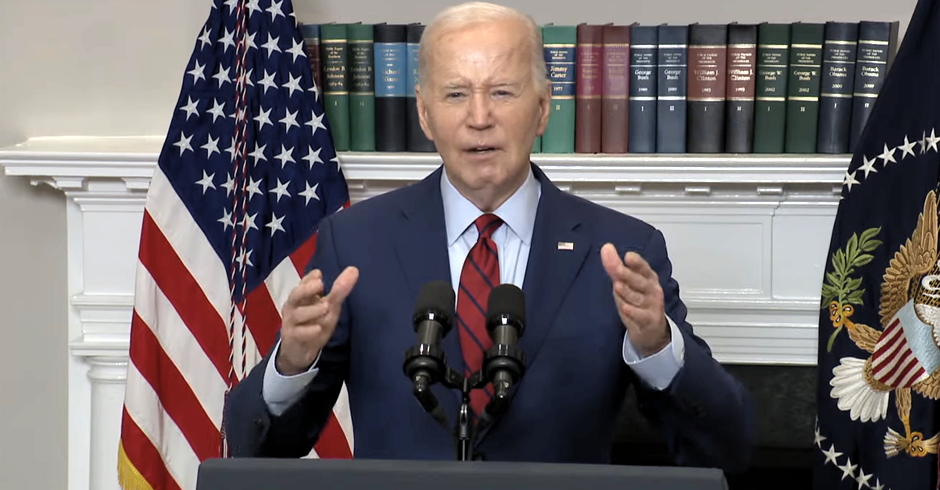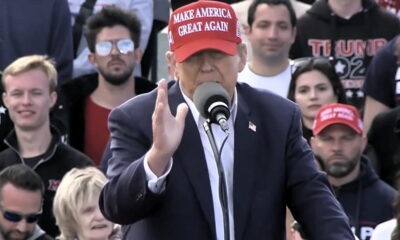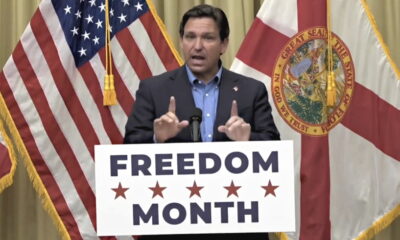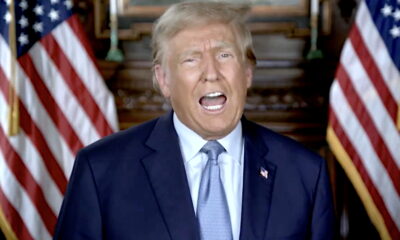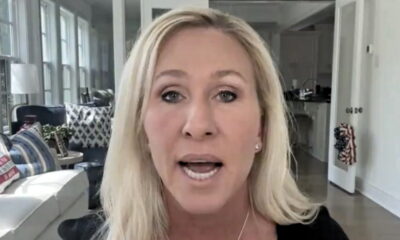Exclusive LGBT Pride Interview with Tara Sonenshine, Under Secretary of State for Public Diplomacy
Tara D. Sonenshine, the new Under Secretary of State for Public Diplomacy and Public Affairs outlines in this exclusive interview with the New Civil Rights Movement, dozens of ways U.S. foreign policy is advanced on behalf of LGBT persons around the world. Â Â
Under Secretary of State Tara D. Sonenshine, who is the chief of public diplomacy and public affairs at the State Department, gave an exclusive interview to The New Civil Rights Movement this week on the occasion of LGBT Pride month.  Sonenshine, who came to the State Department from the U.S. Institute of Peace as the Executive Vice-President, has a distinguished career in communications and government, including an award winning tenure in television journalism at ABC’s Nightline as a producer and reporter where she garnered 10 Emmy news awards.  She was sworn in on April 24th and  is the seventh person to hold this position (the photograph of Secretary of State Hillary Clinton congratulating Under Secretary Sonenshine following her swearing-in was provided by the author).
Just two months into her tenure, the savvy social media under secretary can be found on Twitter @Tsonenshine.  This week she makes her inaugural debut in a live global  tweet on Wednesday, June 27, 11:00 a.m. EDT. Using @StateDept with hashtag #AskState or @USAenEspanol using hashtag #AskUSA (seven other languages will also be accessible), interested followers can ask Sonenshine questions about the State Department and her responsibilities.
Since her swearing-inl, Sonenshine  has hit the ground running, traveling to China (along with Secretary of State Hillary Clinton during the Chen Guangcheng crisis) and later to Pakistan.  In between, she delivered graduation remarks to Columbia University’s School of International and Public Affairs 2012 graduating class.  And not skipping a beat as she pivoted into June’s Pride month, Sonenshine enthusiastically shared the latest public diplomacy efforts to promote LGBT human rights over the weekend in Germany, where the U.S. Embassy participated  in Berlin’s famous Christopher Street Day parade.  According to Sonenshine, Ambassador Philip Murphy joined Berlin Mayor Klaus Wowereit, other diplomats and local politicians to open this year’s parade.  U.S. Mission staff and GLIFAA (gays and lesbians in foreign affairs agencies) representatives from Frankfurt and Hamburg came to Berlin to participate alongside their Berlin colleagues. A cheering crowd of between 500,000 and 700,000 watched the parade wind its way through central Berlin–from Kreuzberg, through Mitte, before ending in front of the Reichstag (the national parliament building).
NCRM QUESTION:  You were recently sworn in as the Under Secretary of State for Public Diplomacy and Public Affairs (relatively new position). What are your responsibilities? What has been the main focus in getting up to speed on your responsibilities?
ANSWER:  It is an honor for me to serve in this new position which oversees all aspects of public diplomacy. Public diplomacy is a shared means to a shared goal of extending America’s reach and security by influencing how individuals around the world come to know and understand us. It is about the advancement of our foreign policy goals through people-to- people connections in a complex, globally networked world. The under secretary’s goal is to better understand ways in which public diplomacy can bolster international relations and national security. U.S. public diplomacy leverages core American values of inclusiveness, diversity, and pluralism both in the audiences we reach and the messages we impart.  Our public engagement proceeds from a fundamental foundation and a deep historic sense of justice and fairness, openness and transparency, and inclusion of a multiplicity of voices and views.
NCRM QUESTION:  A few weeks ago during gay Pride month, State Department officers visited the offices of the Washington Blade, a national gay newspaper.  What was the purpose of the visit?
ANSWER:  The purpose was awareness building, and outreach. Journalists from 20 nations visited the offices of the Washington Blade as part of a special reporting tour organized by the U.S. State Department to brief the journalists on how the U.S. addresses LGBT-related issues.
NCRM QUESTION:  Secretary of State Hillary Clinton has made “people to people diplomacy” a top priority.  And she pronounced that “gay rights are human rights and human rights are gay rights”. How do you see  doing your job in support of these strategies and principles with the LGBT community both here in the US and abroad?
ANSWER:  Using social media and personal engagement can amplify messages. U.S. Embassies and consulates worldwide are declaring support for the human rights of LGBT people through innovative public diplomacy, including:  publishing op-eds; speaking on radio programs; using social media; hosting film screenings and performances; hosting panel discussions and round tables; and actively participating in local events. The Department supported this outreach by posting approximately 100 articles, texts, and transcripts amplifying remarks by senior administration officials and important events related to LGBT.
In addition, the Bureau of Educational and Cultural Affairs (ECA) is poised to issue two new policies to advance LGBT rights:  (1) the ECA Bureau-wide diversity statement-which lists groups of underrepresented individuals encouraged to participate in its exchange programs-is about to expand to include LGBT persons; and (2) the Fulbright scholars program will begin offering the same benefits to committed same-sex partners that are currently being offered to other dependents.  ECA exchange programs offer LGBT persons who work on LGBT-related issues from around the world opportunities to meet and collaborate with their American professional counterparts.  In particular, the International Visitor Leadership Program (IVLP), has already brought groups to the United States focusing on issues important to the LGBT community and has planned future projects on LGBT-related topics.  Other IVLPs already incorporate meetings with LGBT advocacy groups on programs that cover human rights, civic participation and gender issues.
NCRM QUESTION:  As you know, many political regimes do not prevent violence–can even encourage violence against LGBT people as documented in the State Department’s human rights reports, for example “corrective rape” of lesbians in South Africa which Secretary Clinton mentioned at the publication of the 2011 human Rights report and a repeated effort to adopt a legislative measure that criminalizes homosexuality in Uganda. What public diplomacy methods are used in these situations that can create safer spaces for LGBT people? Another example of violence perpetrated against LGBT people in Uganda occurred when a local  newspaper The Rolling Stone that named gays and published photos of them. This hostile situation led to the murder of David Kato in January 2011. What steps has the State Department taken to address these incendiary practices by local media, besides including the issue in reporting and the human rights report?
ANSWER: The Department has implemented an Urgent Response Mechanism (URM) that routinizes the U.S. Government reaction to early warning signs of crises facing LGBT individuals, defenders, and organizations by providing a framework for coordination and action between all relevant Department bureaus.  We have used the URM to respond to crises in Uganda and Iraq.  In both cases, the ongoing internal engagement facilitated by the URM facilitated our leveraging of a wide range of resources and expertise to address the situation through high-level diplomatic engagement, civil society consultation, and emergency programming. Through the creation of the Global Equality Fund, launched by Secretary Clinton in December 2011, we have strengthened our capacity to support civil society organizations and programming seeking to advance and protect the human rights of LGBT people globally.  The Department, along with USAID, has already committed over four million dollars to the fund and is engaging foreign governments and private donors to contribute to this important effort.
NCRM QUESTION:  There is early evidence that new U.S. foreign policy on LGBT human rights has energized the US Embassy’s engagement in Bosnia and Herzegovina which has made a significant difference with the local LGBT community.  I have been told Ambassador has met personally with local LGBT representatives.  This is remarkable as the LGBT community had been driven underground after violent attacks on it in 2008 and 2009. Being open and supportive in Sarajevo has created a more secure environment for the LGBT community. In what ways are embassies carrying out public diplomacy in situations like in Bosnia? And what are the challenges for public diplomacy in environments that are hostile to gay people?
ANSWER:  There are so many good examples: In Albania, Ambassador Alexander Arvizu promoted these human rights on a live regional radio program entitled, “We are different, we are equal.  No to discrimination!” and highlighted the human rights of LGBT individuals in a speech at an academy for public servants. In Kazakhstan, the Embassy has forged a close working relationship with the only NGO that promotes LGBT rights, as well as others civil society groups that support these communities. In Kyrgyzstan, the Embassy’s human rights officer met with Labrys Kyrgyzstan, the leading NGO focused on LGBT issues.  He was successful in establishing open lines of communication and cooperation with Labrys, including on documenting human rights abuses and discrimination against LGBT individuals, some of which was included in the 2011 Department of State Human Rights Report.
In Slovakia, where the 2010 Pride parade ended in violence, Embassy staff brought together more than 20 ambassadors from other nations to sign a public statement of support for the march and hosted a debate. The U.S. Ambassador marched in the 2011 parade next to the mayor of Bratislava, Slovakia’s capital. U.S Embassies and consulates worldwide hosted viewing parties of Secretary Clinton’s “Free and Equal in Dignity and Rights” speech on December 6, 2011, which also garnered over 260,000 unique users to the Department’s social media platform and reached over nine million users on Twitter in the first 24 hours.  The Department also produced a video of the Secretary’s speech, which went viral, receiving 8.5 times the number of views that typical news stories receive on YouTube.
https://youtube.com/watch?v=MudnsExyV78
NCRM QUESTION:  You have taken foreign trips to China and Pakistan since you were sworn in. What have you observed in people to people engagement and in interviews with the media?
ANSWER: What I have observed overseas is that even when there are difficult political issues dividing countries, there is still a space for citizen-to-citizen engagement.  People want education, employment and security.  There are issues of commonality in every society.  I also observed the power of information and was reminded that information is the oxygen with which a society breathes.
NCRM QUESTION:  The domestic LGBT community is very interested in the State Department foreign policy on LGBT rights. Many of us follow it closely and wish out loud that our foreign policy could be applied inside the US. What message do you have for the American LGBT community during June Pride month?
ANSWER: I think this is a time to celebrate the freedoms that America provides.  All around the world people want to come to America and learn about our country.  We have to remain open-minded, tolerant and internationally minded if we want to prosper in the global community and the global marketplace of ideas and ideals.
 The photo of Under Secretary Sonenshine speaking to Columbia SIPA graduating students was taken by the author.  The photo of Under Secretary Sonenshine in her office is courtesy of the U.S. State Department.
Â
 Tanya L. Domi is an Adjunct Assistant Professor of International and Public Affairs at Columbia University who teaches human rights in East Central Europe and former Yugoslavia.  She is a Harriman Institute affiliated faculty member. Prior to teaching at Columbia, Domi was a nationally recognized LGBT civil rights activist who worked for the National Gay and Lesbian Task Force during the campaign to lift the military ban in the early 1990s. Domi has also worked internationally in a dozen countries on issues related to democratic transitional development, including political and media development, human rights, gender issues and media freedom.  She is chair of the board of directors for GetEQUAL. She is currently writing a book about the emerging LGBT human rights movement in the Western Balkans.
Tanya L. Domi is an Adjunct Assistant Professor of International and Public Affairs at Columbia University who teaches human rights in East Central Europe and former Yugoslavia.  She is a Harriman Institute affiliated faculty member. Prior to teaching at Columbia, Domi was a nationally recognized LGBT civil rights activist who worked for the National Gay and Lesbian Task Force during the campaign to lift the military ban in the early 1990s. Domi has also worked internationally in a dozen countries on issues related to democratic transitional development, including political and media development, human rights, gender issues and media freedom.  She is chair of the board of directors for GetEQUAL. She is currently writing a book about the emerging LGBT human rights movement in the Western Balkans.

Enjoy this piece?
… then let us make a small request. The New Civil Rights Movement depends on readers like you to meet our ongoing expenses and continue producing quality progressive journalism. Three Silicon Valley giants consume 70 percent of all online advertising dollars, so we need your help to continue doing what we do.
NCRM is independent. You won’t find mainstream media bias here. From unflinching coverage of religious extremism, to spotlighting efforts to roll back our rights, NCRM continues to speak truth to power. America needs independent voices like NCRM to be sure no one is forgotten.
Every reader contribution, whatever the amount, makes a tremendous difference. Help ensure NCRM remains independent long into the future. Support progressive journalism with a one-time contribution to NCRM, or click here to become a subscriber. Thank you. Click here to donate by check.
 |


